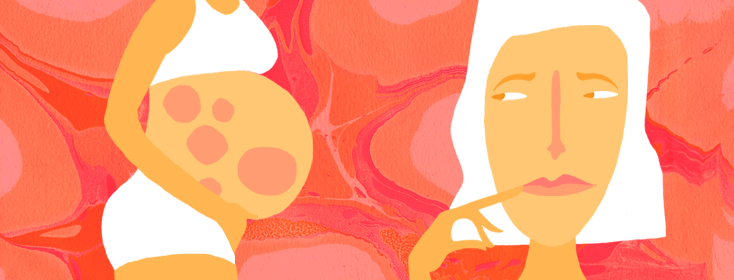Can Psoriasis Be Hereditary?
If you have psoriasis chances are at some point you’ve been curious if the disease could be hereditary. I actually never gave it a thought. In my day, we just didn’t talk about it. Just wasn’t enough research at the time.
But I have come to realize that this is a big deal. I have spoken to young women where this is a big factor for starting a family. Many people with psoriasis worry about how high the risk factor is their children will inherit the disease. It is true family history can play a role in acquiring psoriasis. About 33% or one-third of psoriasis cases show a direct hereditary link of the disease in the family. My parents, grandparents and their parents didn’t have psoriasis. In the past 55 years, it has only shown up with me. My kids didn’t get it and my grandkids don’t have it. We don’t know what will happen down the road.
Risk factors
The most recent statistics show if a parent has psoriasis, then their child has a 10% chance of developing it too. If the expecting mom is having twins, then the odds increase to 20%. When talking about psoriasis, genes are not the primary cause for concern. There are bigger risk factors that can lead to the development of psoriasis-like: infections, environment and smoking.
Treatment considerations for moms
Psoriasis will not affect the male or female reproductive system, so getting pregnant with psoriasis is not a challenge. An issue far greater than “will my child inherit psoriasis,” is the precautions expectant moms with psoriasis need to take. Several treatments, prescriptions and methods used to treat psoriasis cannot and should not be used during pregnancy. Certain prescriptions (like biologics or steroids) can cause birth defects, especially if you want to nurse (breastfeed) your child. Your doctor can discuss what treatments are the safest but most moms stay away from medication and opt for moisturizers until they’re done breastfeeding. Certain UV light treatments are off limits too because psoralen enters breast milk and could cause light sensitivity to infants. I never did any of these things while I was pregnant.
Symptoms during pregnancy
Many expectant moms want to know if their psoriasis will be worse during pregnancy. This subject varies on an individual basis. Some women report their psoriasis improves tremendously (even without the use of medication,) while others have said their psoriasis is worse. My psoriasis got better; never went away, but was much better.
One of the biggest concerns for doctors dealing with psoriasis pregnancy is postpartum exacerbation of psoriasis symptoms and flares. While symptoms and flares are more likely to reduce during pregnancy, they will most defiantly get worse after delivery of your baby. The postpartum period is when women who have moderate to severe psoriasis go through a season of severe psoriasis. This is the time when doctors want to check in on their patients more often because it’s also the riskiest time for severe depression. Postpartum is hard enough in a regular mom but add in psoriasis and it’s a whole new level of emotions. This is the time when you need to follow care instructions the most. Not just care for your baby but specifically and especially for you, a new mom. The care list includes getting enough rest, to getting a balanced diet and taking your supplements or vitamins. New moms with psoriasis should never be ashamed to ask for help.
While psoriasis may be hereditary in some cases, the odds are favorable it will not be passed along to your children. This is your decision to make.

Join the conversation